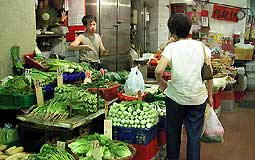 |
| Less popular: A Consumer Council report says there are indications that wet market patronage is declining. |

|
Wet markets are in danger of gradual decline which could have serious implications for consumers in the choice of foodstuffs and household necessities in general, and fresh produce in particular.
The Consumer Council raised this concern in a report of the most comprehensive study to date on the state of competition in the foodstuffs and household necessities retailing sector in Hong Kong.
In the report, the council warned that there are indications that wet markets' patronage is declining in the face of comfort and hygiene concerns - and the 'one-stop-shopping' supermarket chains offer.
In the last decade, the number of supermarket chain retail outlets has grown 29%. The two supermarket chains together command more than 70% of the market share in turnover in the relevant market.
Decline of the wet market affects consumer interest
It also warns that the decline of the wet market industry will affect consumer interest in product choice, price and quality.
The council has put forward the view that there is a strong case for Government to take proactive action to minimise the economic impact of the decline of wet markets through re-engineering of the wet market sector and wokforce re-training.
To maintain a level playing field, the council's first preference is for a competition authority to assess the allegations in accordance with a general competition law that covers the whole economy.
However, given the Government's sector-specific approach, and preference for self-regulation, an alternative is for the sector to create a mechanism for handling competition complaints.
No anti-competitive acts detected so far: Gov't
In response to the council's report, the Government said it will carefully consider the council's recommendations.
The Commerce, Industry & Technology Bureau said there is fierce competition between the major supermarket chains. The supermarket chains also have to compete with other retail stores.
Until now, there are no signs that supermarket chains have engaged in anti-competitive acts or abused their market power. The Government will continue to work closely with the council to monitor the competition environment in the retail sector.
On the introduction of competition law, the Economic Development & Labour Bureau said the Government does not see the need for an all-embracing competition law in Hong Kong, since such a law may:
*not address the special concerns, circumstances and needs of individual sectors and catch instead innocuous economic activities;
*run the risk of over-regulating and creating uncertainties in the business environment; and
* lead to protracted litigation and a large bureaucracy.
To promote and enhance competition, the Government adopts a sector-specific approach, which includes administrative measures not necessarily limited to legislation. This approach affords flexibility, taking into account the circumstances of different sectors, the bureau said.
Moreover, the Government will soon be promulgating a set of guidelines to supplement the Statement on Competition Policy, which sets out its comprehensive competition policy framework.
Meanwhile, the Health, Welfare & Food Bureau said its policy objective is to ensure the foodstuffs offered for sale in wet markets are in compliance with food safety standards. It also committed to reducing public health risks arising from unhygienic market environment or facilities.
The bureau has committed substantial resources to improve the operating environment of public wet markets . It has earmarked over $300 million in 2003/04 for carrying our improvement works to some 30 public markets.
However, it stressed that incumbent stall tenants also have a duty to maintain the viability of public markets.
Supermarket product prices rise despite downturn
Meanwhile, the council's price surveys have indicated that for a basket of supermarket products, there had been increases in retail prices in certain time periods despite the general economic downturn.
In its recent price survey, the average list prices of a selected basket of goods went up by 1.5% during the first half of 2003 compared with the same period of 2002. Taking discount prices into account a decrease of 0.8% was recorded.
For details of the report click here.
Go To Top
|



